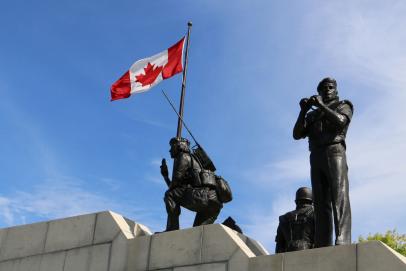Canadian Defence Policy and Armed Intervention

See The Simons Foundation's page on The Canadian Defence Policy Review for briefing papers by Ernie Regehr, Senior Fellow in Defence Policy and Arctic Security at The Simons Foundation.
Canadian Defence Policy and Armed Intervention
October 12, 2016
The UN Security Council has found little to agree on when it comes to Syria, but a year ago the Council did come to the unanimous conclusion that “…there can be no military solution to the Syrian conflict.” The obvious truth of that confession also applies in the 25-plus other wars currently underway – wars in search of military solutions through attacks on political opponents. There have been some 100 such wars since the end of the Cold War, and almost all of them proved that in the end there was no military solution. Armed interventions by powerful military coalitions in search of military solutions faced the same reality – a reality that should inform a new Canadian defence policy.
It has become impossible to win wars so that “winning” actually means something – namely, a military victory that resolves the conflict that spawned the fighting. So the international community faces anew the deeply challenging question of when and how it should intervene in local and regional political conflicts that have turned or are threatening to turn violent and that are leaving vulnerable people in desperate peril.
The predictable failure of contemporary wars to actually settle or over-ride entrenched political conflicts is still a contested narrative: a New York Times analysis claiming that “most civil wars end when one side loses,” so that’s what will be needed in Syria; an academic's claim that “most civil wars end in decisive military victories, not negotiated settlements;” President Obama’s recognition that there is no military solution available in Syria while insisting, in the context of the 2014 draw down of American forces in Afghanistan, that “wars end in the 21st century, not through signing ceremonies, but through decisive blows against our adversaries.”
But no military victory is imminent in Syria, and there are zero prospects for the Taliban being dealt a “decisive blow” in Afghanistan. So, what is to be made of these conflicting claims – that civil wars rarely end in battlefield wins, or that they usually end through decisive wins? The discrepancy is linked to the time period being measured. Surveys of all wars since 1945 do indeed conclude that most wars end through victory and defeat on the battle field, but when wars after the end of the Cold War are accounted for separately, a “dramatic change” in the pattern is revealed. Simon Fraser University’s Human Security Report Project documents the shift, based on the Armed Conflict Dataset maintained by Uppsala University. It finds that in the 1950s two-thirds of wars ended with victories by one side or the other; in the 1960s and 1970s that dropped to 50 percent; in the 1980s victories were down to 36 percent, in the 1990s it was below 20 percent, and in the early years of the 21st Century it was down to just over 10 percent.
The Project Ploughshares record of wars of the first post-Cold War quarter century (1989 to 2014), identifies 64 civil wars that ended during that period. Of those, only nine, or 14%, ended decisively on the battle field. Thirty-two, 50%, ended through negotiations, while 23, or 36%, dissolved or gradually wound down without a formal ceasefire or peace agreement. So, only one in six wars now ends through a clear military victory – and half of those wins go to the insurgents. And, by the way, while Cold War assumptions, supported by research, held that conflicts ended by decisive wins on the battlefield tended to produce a more durable peace than those that ended through negotiations, the post-Cold War experience has been that negotiated settlements have proven to be the more durable.
When wars can’t be won
The inescapable lesson (repeatedly taught but hard to learn) is that superior military force rarely prevails when entrenched political conflicts turn violent. In spite of that, the dominant political narrative still rests heavily on the story of victory in war. It is entrenched in the accounts and remembrances of the great wars of the 20th Century. It is the story understandably drawn on when presidents and prime ministers send troops into battle or welcome them home.
Ironically, that same narrative of force as the final arbiter is perpetuated in calls for force to be used only as a last resort. The just war doctrine holds that war can be justified only when all other avenues have been exhausted – but with that formulation comes the implication that when all else has failed, when no other resolution to entrenched conflict is seemingly available, then the resort to force can be relied on to finally resolve and thus end a conflict. But the real post-Cold War story is of wars fought, not to victories that end a conflict, but to deeply hurting stalemates that cry out for other solutions. Continue reading...
Ernie Regehr, O.C. is Senior Fellow in Defence Policy and Arctic Security at The Simons Foundation, and Research Fellow at the Centre for Peace Advancement, Conrad Grebel University College, University of Waterloo.